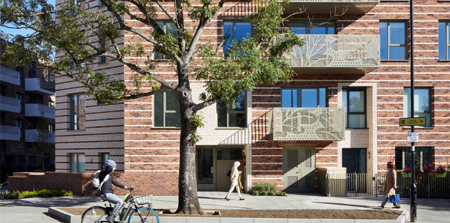

Verna, Acton Gardens
GRID Architects
: Planning Consultant: Barton Wilmore, Local Authority: London Borough of Ealing, Landscape Architect: Land Use Consultants, Structure, Civils & Floor Risk: CTP Consulting Engineers, MEP Consultant: AWA, Transport: iTransport, Daylight & Sunlight: GL Hearn, Energy & Sustainability: Hodkinson Consultancy, Fire: Trenton Fire, Townscape & Visual Impact:Terence O’Rouke, Noise: Hodkinson Consultancy, Photographer: Jack Hobhouse
Verna, Acton Gardens, Phase 9.4 contains 210 high-quality, tenure blind new homes, which all enjoy private balcony, terrace, or garden space in west London. The development provides a 50/50 split between private and affordable homes, and forms a key element in Ealing Council’s Acton Gardens Regeneration masterplan – delivered as a joint venture between Countryside Properties and L&Q (London and Quadrant Housing Association). Several different dwelling typologies of maisonettes and lateral apartments form a secluded development around a communal podium. Gently sloping pathways weave terraced planters to provide level access between the two levels, making it inclusive for people of all abilities. Drawing on surrounding red brick buildings with stucco & string detailing, a cohesive palette unifies the four blocks in a single sculpted form The maisonettes recreate familiar terrace streets with front doors & gardens to encourage people to meet and mix. The island nature of the site means there is good sunlight levels, so GRID Architects have optimised this to create dual aspect apartments, green roofs, courtyard planting and native plant species to enhance biodiversity. Verna, Acton Gardens, is linked to the estate’s centralised energy centre to create CO2 savings, while 394 safe and secure bicycle spaces are provided for residents, accessible from the car park area – informed by feedback that street cycle stores have been the target of theft. The balcony balustrades feature an elegant, perforated oak leaf pattern – a play on the name Acton, which is derived from the Old English for ac (oak) and tun (farm).